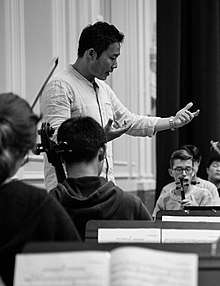Earl Lee
Earl Lee (born 9 December 1983) is a Korean-Canadian[1] conductor and cellist.
Earl Lee | |
|---|---|
 Earl Lee Conducting | |
| Born | 9 December 1983 |
| Occupation | conductor, cellist |
| Years active | 2005–present |
| Website | earlleeconductor |
Early education
Lee was born in Yeosu, South Korea,.[2] He started piano at the age of 5, and started cello at aged 9. His entire family immigrated to Vancouver, Canada in 1995,[3] then settled into Toronto in 1999. Lee began his career as a cellist in the Toronto Symphony Youth Orchestra.[4] He was accepted into the Curtis Institute of Music at the age of 16; he studied cello with Orlando Cole and Peter Wiley.
Earl Lee was diagnosed with focal dystonia when he was 24. He was proactive in finding a solution for his condition; he flew to South Korea to seek a top acupuncture specialist, but did not garner results. He sought out Spanish experts in the condition, but the recovery was very slow and unpredictable. Initially devastated, he turned to conducting as a music outlet.[5]
Continued Education and Career
After graduating The Curtis Institute of Music in 2005, Earl Lee received his master's degree in cello performance from the Juilliard School, where he studied with David Soyer. When he began transitioning into conducting, he studied with Ignat Solzhenitsyn in 2010.[6] Lee received his Masters in Conducting from the Manhattan School of Music in 2013 under the tutelage of George Manahan. His post-graduate conducting studies were done with Hugh Wolff at the New England Conservatory of Music.
Toronto Symphony Orchestra
Earl Lee was the RBC Resident Conductor for the Toronto Symphony Orchestra between 2015 and 2018.[7]
Pittsburgh Symphony
Earl Lee is currently the Associate Conductor of the Pittsburgh Symphony Orchestra.[8]
Awards and recognition
In 2018, Earl Lee was awarded the 50th Anniversary Heinz Unger Award from the Ontario Arts Council, recognizing him as one of Canada's most promising emerging conductor.[9] He received the Felix Mendelssohn Bartholdy Scholarship in 2013, chosen by conductor Kurt Masur; this meant he was invited to travel to Leipzig to study the music and life of Felix Mendelssohn. In 2013, he also received the Ansbacher Fellowship by the American Austrian Foundation [10] and members of the Vienna Philharmonic; this recognition meant spending six weeks at the Salzburg Festival.
External links
References
- "Earl Lee wins RBC Resident Conductor". Newswire. 4 December 2014. Retrieved 5 November 2019.
- "Earl Lee, YIMFE Conductor". Yeosu International Music Festival & Ensemble. Retrieved 5 November 2019.
- "Earl Lee, Cello". Classical Connect. Retrieved 5 November 2019.
- "The Scoop: Earl Lee Named Associate Conductor of Pittsburgh Symphony Orchestra". Ludwig Van Toronto. 25 April 2018. Retrieved 5 November 2019.
- "TSO's resident conductor strikes the right note". Globe and Mail. 12 May 2018. Retrieved 5 November 2019.
- "Earl Lee Biography". Pittsburgh Symphony Orchestra. Retrieved 5 November 2019.
- "Earl Lee wins RBC Resident Conductor". Newswire. 4 December 2014. Retrieved 5 November 2019.
- "Pittsburgh Symphony Orchestra Announces Earl Lee as New Associate Conductor". Pittsburgh Symphony Orchestra. 23 April 2018. Retrieved 6 November 2019.
- "Earl Lee honoured with 50th anniversary Heinz Unger Award". Ontario Arts Council. 12 April 2018. Retrieved 6 November 2019.
- "The Ansbacher Fellowship for Young Conductors (2008-present)" (PDF). The American Austrian Foundation. Retrieved 5 November 2019.